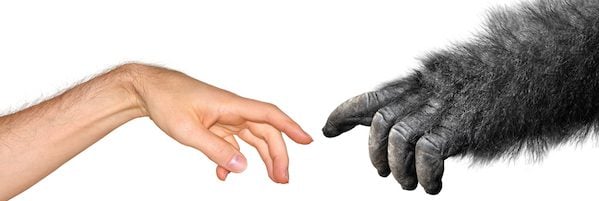by Dale McGowan
Once you cast doubt on man’s place in creation, the entire Biblical story of salvation history, from original sin to Christ’s incarnation, is also threatened.
TULLIO GREGORY, Libertinisme Érudite in Seventeenth-Century France and Italy
The organization BioLogos is dedicated to reconciling evolution with a biblical worldview. I love the idea of helping more people accept evolution. Yet here I am all conflicted, and not even sure whether I should say why I’m conflicted.
I’ll explain, but let’s keep this between us.
Evolution by natural selection is fatal to conventional religious belief, at least the Abrahamic kind. It doesn’t just snap one branch of religion. Challenging the idea that humans are special and separate from animals uproots the whole tree, mills it into lumber, and builds a really nice house out of it — and not, I should add, a house of God.
The complexity of the universe, and especially of life on Earth, seems for many to require a designer. “I may not know what God looks like or thinks or wants,” they say, “but come on! I can’t believe that this tree/moose/human just knitted itself together by random chance!” They’re right. If there’s anything less likely than a supernatural God, it’s the idea that all of this happened by random chance. Somebody once compared that idea to a whirlwind passing through a junkyard and assembling a 747.
For most of human history, those were the two apparent choices, God or random chance. Given those choices, I’m not surprised most people opted to believe in a designer. But in 1859, Darwin published the theory of evolution by natural selection. Suddenly people had three choices — and Darwin’s theory, properly understood, finally provided a credible fit for the evidence.
It’s worth taking a moment to describe how evolution works:
- All organisms include differences among individuals.
- Some of these differences don’t matter. Some have a negative effect, making it harder to survive or to have as many offspring. But some differences are actually helpful, making it a little easier for the individual to live longer or have more offspring.
- If the difference — say a slightly longer beak — gives even a tiny advantage, the lucky organism may live a little longer and/or have slightly more offspring on average and pass the same feature to them. The advantage will have been naturally selected. It’s not magic, just math.
- The offspring will in turn pass the slightly longer beak on to their own slightly greater number of kids, and so on. And if one of them has an even longer beak, the selective process continues. Eventually, if the longer beak keeps giving an advantage, it becomes the norm in the population.
- Fast-forward millions of years, and millions of selected traits produce the incredible diversity and complexity of life.
The variation is random, but the selection is anything but random. And it happens not in a straight line, but in fits and starts…and stops. A trait that was advantageous for millions of years can suddenly become a millstone when conditions change, as they often do. That’s why over 99% of species that have ever existed have clocked out for good.
Religious believers who want to reconcile evolution and religion say God uses evolution to create this diversity, but honestly, there’s not much for him to do. Natural selection works just fine without a guiding hand. In fact, if you fully understand the theory, it’s clear that it works inevitably without such guidance.
Simply put: If there is a guiding intelligence, it does an extraordinary job of pretending it isn’t there.
The implications for religion
Evolution by natural selection is one in a series of discoveries that removed us from our central and special role in the scheme of things. The Abrahamic religions are all strongly and centrally premised on the special human place in the scheme of things, and none more so than Christianity. Every major assumption, from sin to soul to salvation to savior, relies on the idea that we are separate and distinct from other animals.
Millions of Christians accept evolution, which makes me very happy. Some alter their beliefs to accommodate the new knowledge. But many refuse to accept the full implications, since those implications require an incredibly radical rethink of their religious beliefs. Many say that God created life, then used evolution to create the diversity of life, including one special kind of creature, crafted in the image of God and endowed with an immortal soul. That’s us.
“We are obligated, as people who bear the image of God,” says one BioLogos spokesperson, “to recognize the world that God has made.”
But here’s the problem. It’s difficult to reconcile our image-of-Godness with the knowledge that evolution was not aimed at making us. Thinking we were an intentional product guts the whole enterprise. The countless blind, wasteful, weaving paths and dead-end alleys of the history of life on Earth make it clear that—clever and handsome though we are—we are merely one of these side streets, impressive in our way and to ourselves, but otherwise unremarkable. The process that created us is necessarily unguided on the large scale, and guided locally only by the fickle demands of natural selection in that place and time. To make evolution a tool God used to create “Man,” much less to create him in his image, requires either a fatal upheaval in the concept of evolution or a fatal upheaval in the concept of God. The choice is yours.
I grant religious fundamentalists a point for noticing this problem.
Once common descent is in the picture, the idea of the soul is also in trouble. If other animals are without this lovely thing, God must have chosen a moment in evolutionary history when we were “human enough” to merit souls. Since evolution is an achingly incremental process, there was no single moment when we crossed a line from “prehuman” into “human.” Even if you posit such an arbitrary point, we’re left with the odd prospect of a generation of children who are ensouled but whose parents are not, or some similarly strange scenario. If there’s a way to work this out that makes any sense, I haven’t heard it yet.
“Not really a tactical fellow myself”
I don’t mind making these points. But when these folks are essentially supporting a discovery I find both powerful and important to our understanding of the world and ourselves, I’m left wondering how far to push the point.
If someone chimes in on your side of an argument, but does so with reasoning that massively misrepresents the case, what do you do—keep your mouth closed and accept the support, or set them straight and risk losing it? I strongly supported Barack Obama in both elections. Suppose a friend had expressed equally strong support for Obama, saying, “I just really love the idea of a Muslim president!” Would I have cleared that up, or walked away whistling, glad for the ally?
This question was in my head the first time I met Richard Dawkins. I was teaching at a Catholic college where evolution was the centerpiece of the biology curriculum, and I asked Dawkins what he considered the best way to respond to the idea of theistic evolution. Do we push the point that evolution creates serious, arguably fatal problems for some defining tenets of Christian belief, or be happy for allies against fundamentalist opposition to evolution?
“You’ve asked a tactical question, I suppose,” he said, grinning. “Not really a tactical fellow myself. So I think the answer depends on whether you are Richard Dawkins or Stephen Jay Gould.”
Since only one of us was either, this didn’t help.
He went on to say that he would certainly push the point, and does, since that’s what inquiry is about. The idea of withholding challenge to protect a pet hypothesis is anathema to Dawkins. Gould was always more tactical and strategic, taking allies where he could find them.
I tend more toward the Gouldian because I’m a pragmatist, guided by a desire for the best outcome more than ideological purity. I want science to be more widely accepted and understood, and if you force people to choose between doing violence to science and doing violence to their conception of God, most will have little trouble making up their minds.
But when it comes down to brass tacks, and I hear exactly how a believer has reconciled evolution and faith, I often find my head and desk connecting in ways that really can’t be good for the desk.
The devil in the details
In a BioLogos video titled, “Adam and Eve: Engaging the Tough Questions” [headdesk], an advisor notes that there are “a lot of proposals out there of when the first sin might have happened, what it might have looked like.”
“At BioLogos,” says the voiceover, “we don’t have a simple answer on the question of the historical Adam…who were Adam and Eve, when did they live?”
This is always the first step in a crumbling theology – the suggestion that the answer is out there, it’s just very, very complicated. The problem is our ability to grasp the answer. But no worries, there are a lot of proposals. It all makes for an impressive simulacrum of rigor, an army of question marks in search of meaningful questions.
BioLogos advisor Denis Alexander cuts to the chase, drawing the line clearly: “We need to bring everything in our lives under the Lordship of Christ, and that includes our science.”
Okay then. And if science calls the very foundation of that lordship into question…what then?
It’s not that every form of religious faith is incompatible with evolution. It can be done, but it must be done honestly. Many progressive Christians have reconciled the difference by letting go of more literal elements such as Adam and Eve and original sin while holding on to the basics of their faith—that God exists, that he loves us, and that he wants us to love each other.
Some of these honest and thoughtful believers hold that God created life, started the ball rolling, then let evolution do its work. It was an experiment. He wasn’t aiming for us—he didn’t even know how it would come out. Go there ye faithful, and be glad, for it contradicts nothing we know. But recognize as these folks have that some beloved ideas will have to yield in the process, ideas like God’s omniscience and human specialness, and that a great many other assumptions must die with them.
There are many consolations on the other end of that process, including a new sense of wonder that’s hard to fully capture. All life on Earth is directly related by descent. You are a cousin not just of apes, but of the sequoia and the amoeba, of mosses and butterflies and blue whales. Don’t try to fit that astonishing fact into your theology. Start there, then see what gods you find.
[Creation parody photo via Shutterstock.]
 Dale McGowan, Ph.D. is Managing Editor of the Atheist Channel at Patheos and author of In Faith and in Doubt and Atheism For Dummies. He holds a degree in physical anthropology from UC Berkeley.
Dale McGowan, Ph.D. is Managing Editor of the Atheist Channel at Patheos and author of In Faith and in Doubt and Atheism For Dummies. He holds a degree in physical anthropology from UC Berkeley.
















